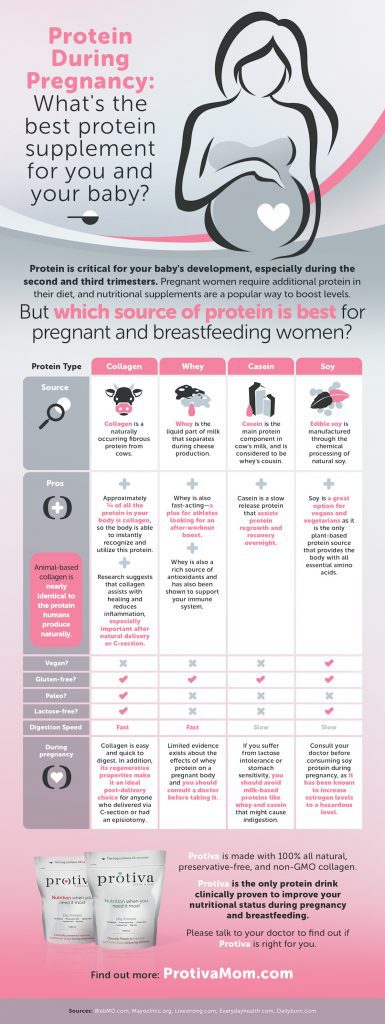Protein during pregnancy is a crucial nutrient for women and their developing babies. But expecting moms often wonder, are protein supplements safe? And even if they are, will they be easy on pregnant tummies?
Protein powders generally use whey, soy, and casein protein. Protiva, however, uses collagen—a naturally occurring fibrous protein that supports connective tissue growth. Collagen’s regenerative properties make it an ideal post-delivery choice for anyone who delivered via C-section or had an episiotomy.
Collagen also helps support joints, ligaments and tendons – which can call be affected throughout the pregnant and postpartum periods.
Supplementing with Protiva during pregnancy and the months after baby arrives helps new mothers maintain more optimal protein levels, which helps to boost energy and repair the body.
Not all proteins have the same effect on the body. Here is a breakdown of the most common types of protein and their advantages.
Facts About Collagen Protein
Collagen is a naturally occurring protein our bodies make, but can be affected by pregnancy, wear and tear, and aging. Supplemental collagen is sourced from land animals and some marine life, including pigs, cows, chickens and fish. Protiva’s collagen is soured from porcine, which has been clinically proven to have the closest allergen profile to that of a human.
- Approximately 1/4 of all the protein in the human body is collagen.
- Research shows that collagen assists with healing and reduces inflammation especially important after natural delivery or C-section – making collagen a great protein during pregnancy and beyond.
- Protiva collagen is gluten free, paleo and lactose free.
- During pregnancy collagen is easy and quick to digest. In addition, it’s regenerative properties make it an ideal choice after delivery.
Facts About Whey Protein
Whey protein is simply the liquid part of milk that separates during chess production.
- Whey is fast-acting, which is why it’s often a preferred choice for athletes.
- Whey is also a good source of some antioxidants, which can help support the immune system.
- Whey is gluten free.
Facts About Casein Protein
Casein is the concentrated curded protein remaining in dairy after the liquid whey is extracted.
- Casein is a slow-digesting protein, and aids in regrowth and recovery most ideally when taken before bedtime.
- Casein is gluten free.
- If you are lactose intolerant, intolerant to dairy or think you might be, casein and whey – both dairy-based proteins, should be avoided.
Facts About Soy Protein
Edible soy, including tofu, soy milk, soy powder, edamame and tempe, is manufactured through the chemical processing of natural soy.
- While soy may be a complete source of protein, it is largely genetically modified (GMO) and subject to myriad pesticides.
- Soy is a slow-digesting protein.
- Soy is vegan, gluten free and lactose free.
- If you are pregnant and considering supplementing with soy, consult a doctor first. Soy has been shown to increase estrogen levels, which can be detrimental to health.
Our latest infographic details the differences between protein supplements to help you decide which one is right for you. Take a look, download our fact sheet, and talk to your doctor to find out how Protiva can help you get the protein you need.
Click the image below to see it in full.

